Your login information returned multiple users. Please select the user you would like to log in as and re-type in your password.
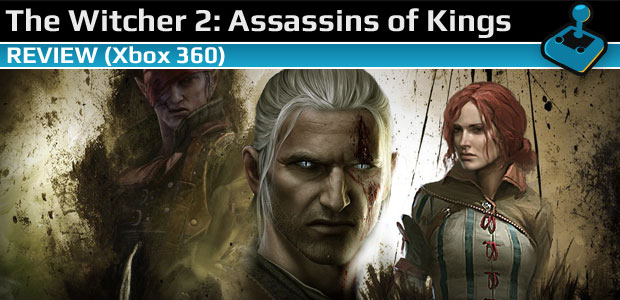
 Plenty of innovation in the gaming industry comes from Japan and North America. While these developers continue to push boundaries and reshape the landscape of our beloved medium, more often than not it seems that our European colleagues are forced to take a back seat thanks to incredibly large marketing campaigns and press demonstrations that simply can’t be afforded by anyone not being published by the likes of EA, Ubisoft or any of other large houses. One brand that thankfully has pierced this veil has been The Witcher, a series based on Polish fantasy novel series. CD Projekt RED, the developer behind the video game adaptations, released the first two games on PC this generation. Prior to their announcement of The Witcher 3 though the team has chosen to release an updated version of the second game, Assassins of Kings, and port it to the Xbox 360, the team’s first home console project.
Plenty of innovation in the gaming industry comes from Japan and North America. While these developers continue to push boundaries and reshape the landscape of our beloved medium, more often than not it seems that our European colleagues are forced to take a back seat thanks to incredibly large marketing campaigns and press demonstrations that simply can’t be afforded by anyone not being published by the likes of EA, Ubisoft or any of other large houses. One brand that thankfully has pierced this veil has been The Witcher, a series based on Polish fantasy novel series. CD Projekt RED, the developer behind the video game adaptations, released the first two games on PC this generation. Prior to their announcement of The Witcher 3 though the team has chosen to release an updated version of the second game, Assassins of Kings, and port it to the Xbox 360, the team’s first home console project.
Assassins of Kings received rave reviews when it was released last year but, a year later and on a brand new platform, does The Witcher 2 Enhanced Edition find itself well adapted to gamers with inadequate PCs?
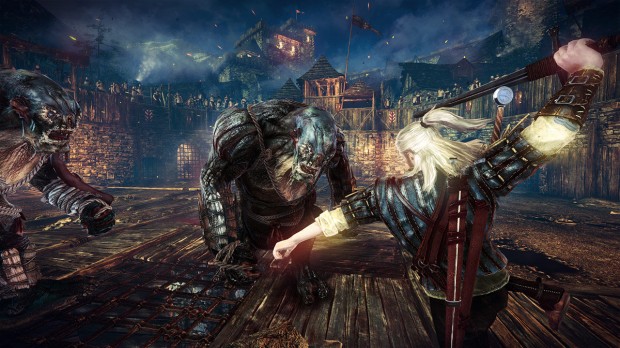 The Witcher 2 Assassins of Kings Enhanced Edition (Xbox 360)
The Witcher 2 Assassins of Kings Enhanced Edition (Xbox 360)
Developer: CD Projekt RED
Publisher: Warner Bros. Interactive Entertainment
Release Date: April 17, 2012
The Second Coming of the White Wolf
Based on the novel series started by Polish author Andrzej Sapkowski in the 90s, the universe of The Witcher takes place on what is simply known as The Continent. Dominated by humans who relegate all other species to the status of being second class citizens, the land is primarily divided into two major regions: the ever-growing Nilfgaardian Empire in the south and the divided Northern Kingdoms. In a world of Elves, Dwarves, Trolls and all manner of magic folk, the citizens of this world live in constant threat of the monsters and evil creatures that lurk in the shadows. Where a brigade of soldiers or a powerful mage fail there are those amongst us who border on being monsters themselves, ones whose abilities and powers bridge the gap between mage and warrior. These rare beings are known as witchers.
Once human, witchers are mutated at a young age and given supernatural abilities allowing them to see in the dark and exercise limited amounts of magic. These mercenaries are both hated and yet a necessity to quell the threat of the monsters of the world and few are more famous than Geralt of Rivia, the series’ protagonist. Several months prior, Geralt had served and saved King Foltest of the Northern Kingdom of Tameria from an assassin. Grateful, Foltest employs Geralt as a bodyguard.
At the start of Assassins of Kings, Geralt is imprisoned in the dungeon of La Valette castle, a fortress King Foltest had laid siege to in an attempt to quell a rebellion. Geralt recounts his story to fellow brother in arms Vernon Roche who reveals that, on the cusp of victory, Foltest was murdered by a witcher assassin who escaped just in time to frame Geralt for the crime. Believing him, Roche aids Geralt in escaping the castle and, with the aid of sorceress Triss Marigold, the trio set out to find the assassin and bring light to this sinister conspiracy.
Like most large RPG releases on the market today, The Witcher 2 makes a point of giving the player choices, both minor and major, that shape the plot. Some might be as small and simple as creating a trap that later aids in a boss fight. Others, such as one major one you have to make in the first chapter, can change the course of the rest of the game and have severe end-game consequences. Unlike other titles however these choices feel a bit more personal and direct in terms of action and result, making these moments feel far more important than in a game like Mass Effect.
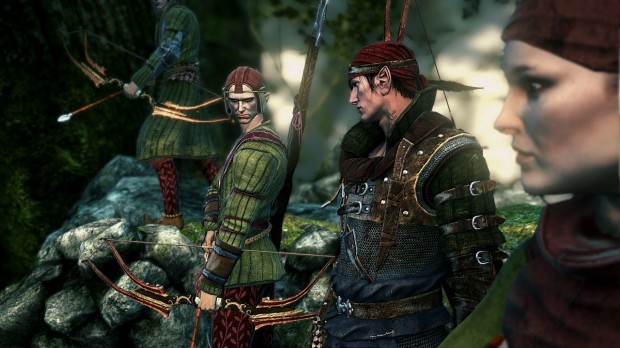 Probably the most intriguing part of the choices present to the player is the nature of them. Most RPGs tend to employ a morality system and weave these choices in to present a plot that diverges based on good/evil decisions. The Witcher 2 doesn’t utilize this gameplay structure however, instead opting for a design which has mostly morally gray ones. More often than not there is no right or wrong decision to be made in the game and, despite some of them resulting in dire, world altering moments, CD Projekt RED’s focus on Geralt’s story rather than trying to deliberately change the world as a whole makes for a far more interesting and wondrous experience.
Probably the most intriguing part of the choices present to the player is the nature of them. Most RPGs tend to employ a morality system and weave these choices in to present a plot that diverges based on good/evil decisions. The Witcher 2 doesn’t utilize this gameplay structure however, instead opting for a design which has mostly morally gray ones. More often than not there is no right or wrong decision to be made in the game and, despite some of them resulting in dire, world altering moments, CD Projekt RED’s focus on Geralt’s story rather than trying to deliberately change the world as a whole makes for a far more interesting and wondrous experience.
One issue I could not help finding myself at odds with though was just how much The Witcher 2 makes mention of the previous game’s story. As a newcomer to the Witcher universe as well as a console player I became quite confused at most of the instances that discussed the events of the first game. Had The Witcher been released on consoles as well I’d be more inclined to dismiss this as Xbox 360 owners would have the option to play it but, given the previous game’s platform exclusivity and the lack of inclusion of a preamble explaining who Geralt is and what his previous exploits encompassed, it results in quite a bit of player confusion. Assassins of Kings instead does little more than continue the plot set up in the first game and forces the player to learn about people and things like the Grand Master and the Golden Dragon on their own in the game’s quest codex. The information provided is ample but, for a game that puts such a strong emphasis on story, it doesn’t provide much context for newcomers.
Despite this, The Witcher 2 delivers a strong narrative that will keep you wanting to play far later into the evening than you should. With a strong story and side quests you can find yourself putting in well over forty hours in a single playthrough. Couple this with branching story paths and multiple endings and the result is a game that almost demands being played through twice if not more. You’ll come away satisfied with the story and quite excited for the prospects of The Witcher 3.
The Butcher of Blaviken
Despite having been born and raised on the PC, The Witcher 2’s Xbox 360 port makes the game almost feels like it is better suited for a controller than a mouse and keyboard. Some PC quirks such as the lack of procedural movement for analog sticks and more mouse friendly menus unfortunately do make the transition to the console but, for the most part, it is a fine translation. The arrangement of the buttons fits most of the appropriate actions taken normally in the game and they flow quite well so you should find yourself getting the hang of most of the in-game actions within at least the first hour or so.
Combat in The Witcher 2 is an exercise in patience and is certainly difficult to master. Despite the controls being fairly adaptable, the gameplay forces the player to focus almost entirely on playing defense. Geralt does regenerate health over time but it takes a decidedly long time to regain it, lasting well past your most recent battle. Players will not find anything resembling a standard health item for instant regeneration either so dodging and blocking the attacks of your enemies is an absolute necessity. Unlike other hack-n-slash games you’ll find yourself staring at the ‘game over’ screen more often than you’d like even on normal. It isn’t nearly as difficult and repetitive a games as the likes of Dark Souls but it can still be quite difficult at times. Several enemies in particular can be especially heinous in just how punishing they can be so take some advice from me: save, and save often.
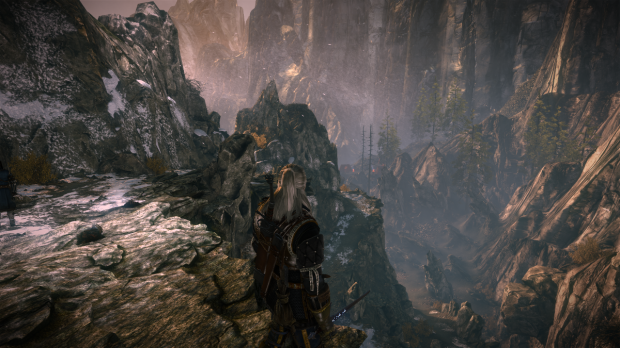 As a witcher, Geralt is forced to face enemies both sentient and not but, unfortunately, his variety of weapons doesn’t allow for much variety in combat. Players can equip two primary weapons at any given time, one dedicated for human and elven combat while keeping a default silver sword for fighting monsters. Players can trade out their normal sword for an axe, club and other items but, more often than not, the game will hand you a new sword to use. Shields cannot be equipped, nor can items like spears and halberds despite many of your opponents using them. Geralt may be a professional monster hunter but, despite definitely having the skill to take on the task, CD Projekt seems intent on keeping his weapons focused on blades and not much else.
As a witcher, Geralt is forced to face enemies both sentient and not but, unfortunately, his variety of weapons doesn’t allow for much variety in combat. Players can equip two primary weapons at any given time, one dedicated for human and elven combat while keeping a default silver sword for fighting monsters. Players can trade out their normal sword for an axe, club and other items but, more often than not, the game will hand you a new sword to use. Shields cannot be equipped, nor can items like spears and halberds despite many of your opponents using them. Geralt may be a professional monster hunter but, despite definitely having the skill to take on the task, CD Projekt seems intent on keeping his weapons focused on blades and not much else.
To augment Geralt’s paltry weapon selection though our main character has access to magic spells known as Signs. Players have immediate access to all five signs in the game upon startup with a sixth being unlockable provided the player does some strong character leveling. Each of these abilities have distinct advantages and disadvantages but you will find yourself falling back on one in particular for the majority of the game: Quen, a spell that protects you from a certain amount of damage, is easily the game’s biggest combat-related crutch. Signs are definitely helpful in being forced to take on multiple opponents and since you magic quota regenerates considerably faster than your vitality, you can easily find yourself using several different spells multiple times during a conflict.
Pursuers of the Wild Hunt
CD Projekt RED’s initial launch of The Witcher 2 last year yielded a phenomenal graphics powerhouse of a game, stunning gamers in a way not really done on the PC since Crysis. I’m happy to report that the transition to the Xbox 360 has yielded minimal issues and compromises. Throughout many parts of the game you might find yourself a bit stunned as to the presentation brought forth, the first chapter of the game in particular showing off a fantastic looking forest. The nature of these graphically beautiful worlds does a great job of disguising just how compact each hub area in the game actually is, though it is a bit disappointing once you can see through the facade. Character models look great, dialog syncing is spot on and, aside from the occasional facial mocap bug, every character emotes in a believable manner.
The audio portion of the game’s presentation is probably one of this year’s best 5.1 surround sound mixes. Standing in the middle of the forest outside Flotsam you’ll hear birds singing, the creaking of trees, the distant howls of enemies; all of it presenting itself in a wonderful, almost symphonic presentation that gives you the feeling that you really are in this ancient, untamed environment. Character voices and very well done and the actor’s presentations really give the player a sense of just how conflicted society is in The Witcher series. The only downside to the acting you’ll find is in the form of Geralt himself as, for a majority of the game, he seems quite monotone and unexcited. Hopefully this will change with The Witcher 3 but, as this game stands, Geralt doesn’t seem nearly as emotionally invested in the story he finds himself in, especially so given how much of a journey his character undergoes in the series.
As the Enhanced Edition stands, Assassins of Kings yields a fantastic demonstration of what this generation’s consoles are still capable of despite being nearly seven years old.
I’ve made it clear in the past that I’m just not a fan of traditional fantasy titles. Elves, Orcs, Dwarves: if your game has them and a traditional fantasy narrative chances are that I’m not going to be interested. The Witcher 2, on the other hand, tickles my fancy by incorporating one of the more mature, well thought approaches to a story seen this generation. Series like Lord of the Rings allow for an epic journey yes, but The Witcher 2’s approach allows you to shape a fantasy story in ways that I can’t recall having been done in the genre before. The game’s relationships feel real, the power of Geralt of Rivia is satisfying and your influence on the world is fantastically strong. While the lack of information for console-only players about Geralt’s previous adventure is regrettable, the series’ future is very bright.
Assassins of Kings’ Enhanced Edition is not only a great game, it’s also a great port to consoles. For gamers who love a good story and a fantastical, interesting narrative, you can’t afford to ignore The Witcher.
Score: 90%
90-99%: Phenomenal - A fantastic experience that surpasses almost all expectations.
(DISCLAIMER: THIS REVIEW WAS WRITTEN FOR CD PROJEKT RED'S "REVIEW THE WITCHER 2" EVENT AND WAS SUPPLIED TO SELECTED REVIEWERS SHORTLY AFTER THE GAME'S RELEASE. DUE TO TIME CONSTRAINTS, THIS REVIEW HAS BEEN REPRINTED FROM CHRIS DAVIS' PERSONAL BLOG AT SLACKERWERKS.COM AS THE INTENDED REVIEWER RAN OUT OF TIME TO WORK ON THE GAME.)



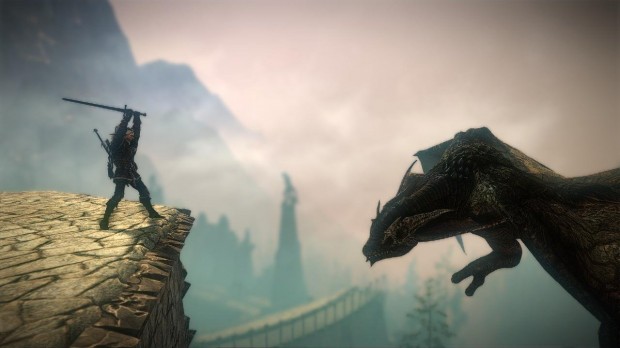
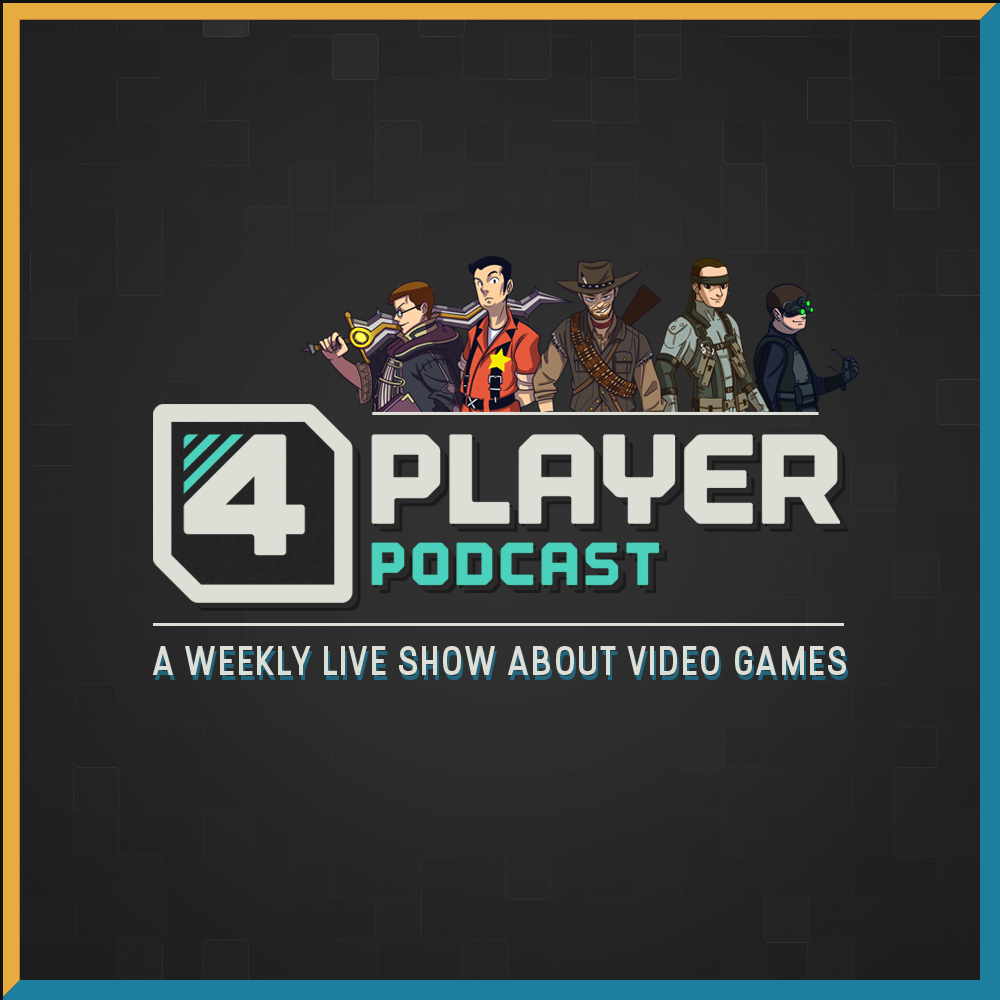
Comments
12 years, 7 months ago
The story in both Witcher games are pretty stand alone. I played the first game and read the books and I was still confused/overwhelmed with some things in the Witcher 2 until I started reading the Codex. Good review Chris.
Also like you say Chapter 2 NEEDS to be played through twice, one for each side, or else you miss some pretty big story plots.
12 years, 7 months ago
Thoroughly enjoyed the review and I felt you nailed a lot of good points and your negatives were all justified except: "The only downside to the acting you’ll find is in the form of Geralt himself as, for a majority of the game, he seems quite monotone and unexcited. Hopefully this will change with The Witcher 3 but, as this game stands, Geralt doesn’t seem nearly as emotionally invested in the story he finds himself in, especially so given how much of a journey his character undergoes in the series."
I think this is story-related, witchers don't get emotional and are seen as indifferent and numbed to the world around them due to both their training and their profession. While his voice actor could add some more depth into the character, I think that having a monotonous and indifferent Geralt is befitting of this trait amongst witchers, they aren't supposed to get emotionally attached or fall in love with things, though... I think anybody that has an interest in this story knows Geralt is a different case.
Great review again, looking forward to hearing even more from the 4PP crew as the others wrap up their stories.
12 years, 7 months ago
Great review, thanks!
12 years, 7 months ago
Congratulations Chris!